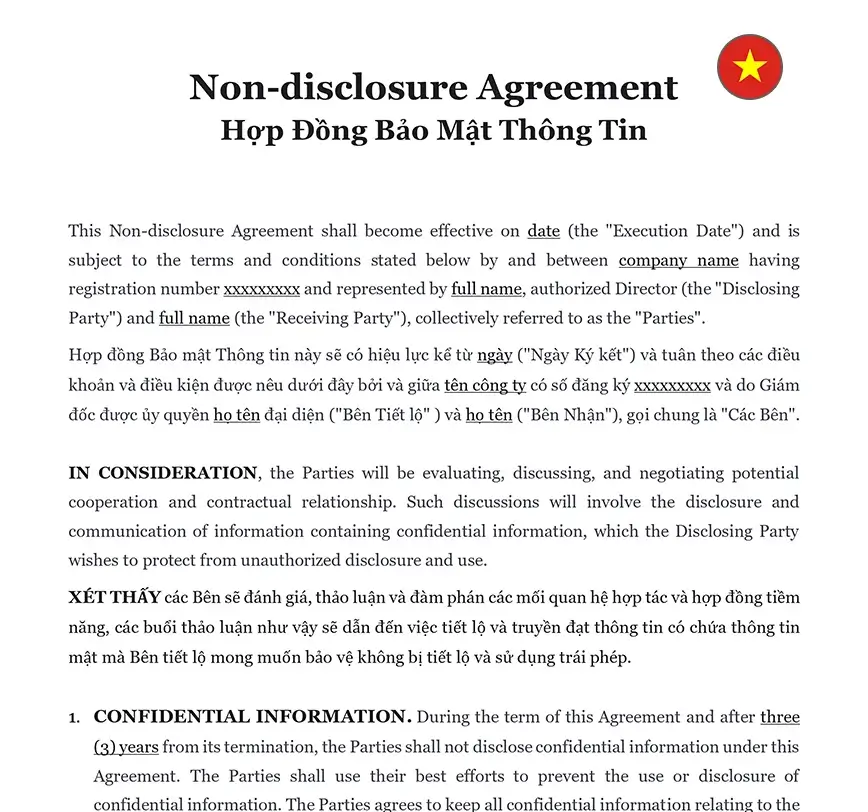Ready to use legal template
Drafted by experienced lawyers
Vietnamese-English translation
Ready to use legal template
Drafted by lawyers
Vietnamese-English translation
Home › Business contracts › Non-disclosure agreement (NDA)
Learn more about Non-disclosure agreement (NDA)
A Non-Disclosure Agreement (NDA) is a legal contract that protects confidential information shared between parties. It ensures that sensitive business details such as trade secrets, financial data, intellectual property, or client lists are not disclosed to third parties without permission. In Vietnam, NDAs are essential for businesses, investors, and entrepreneurs to safeguard proprietary information when engaging in partnerships, negotiations, or employment relationships. An NDA provides legal recourse if confidential information is misused, reinforcing trust and professionalism in business dealings. Whether you are working with contractors, or potential investors, a well-drafted NDA helps mitigate risks and prevent disputes. Download our Non-Disclosure Agreement (NDA), easy to edit in Word format, drafted by legal experts in both English and Vietnamese.
Table of contents
-
What is a Non-Disclosure Agreement (NDA)?
-
What is included in a Non-Disclosure Agreement?
-
When should I use an NDA in Vietnam?
-
Are there any specific requirements for an NDA to be valid and enforceable?
-
Are there any exceptions to what can be protected by an NDA?
-
Are there different types of NDAs for different situations?
-
What type of information does the NDA cover in Vietnam?
-
What happens if someone breaches an NDA in Vietnam?
-
Can an NDA be used to protect ideas or concepts?
-
How should I store and handle documents in Vietnam?
What is a Non-Disclosure Agreement (NDA)?
A Non-Disclosure Agreement (NDA), also known as a confidentiality agreement, is a legal contract between two or more parties that outlines confidential material, knowledge, or information that the parties wish to share with one another for certain purposes, but wish to restrict access to or by third parties. An NDA creates a confidential relationship between the parties to protect any type of confidential and proprietary information or trade secrets. This agreement may be used in a variety of situations, such as when two businesses are considering a partnership or merger and need to share sensitive financial information, or when an employer wants to protect their company’s proprietary information from being shared by employees or contractors.
The key elements of an NDA typically include a definition of what constitutes confidential information, the obligations of the receiving party to maintain confidentiality, the duration of the agreement, and any exclusions or exceptions to what is considered confidential. NDAs are crucial in business dealings where sensitive information is involved, as they help prevent the unauthorized disclosure of valuable information that could harm a business’s competitive position.
What is included in a Non-Disclosure Agreement?
A Non-Disclosure Agreement (NDA) typically includes several key elements to effectively protect confidential information. These elements may vary depending on the specific agreement and the parties involved, but common components include:
1. Definition of Confidential Information
This section defines what information is considered confidential and protected under the agreement. It should be specific enough to clearly identify the types of information covered.
2. Parties to the Agreement
The NDA identifies the parties entering into the agreement, including any affiliates or representatives who are bound by the agreement.
3. Purpose of Disclosure
The agreement should specify the purpose for which the confidential information is being disclosed. This helps clarify the scope of the agreement and the intended use of the information.
4. Obligations of the Receiving Party
This section outlines the responsibilities of the party receiving the confidential information, including the duty to keep the information confidential and to use it only for the specified purpose.
5. Exceptions to Confidentiality
The NDA may include exceptions to the obligation of confidentiality, such as information that is already in the public domain or becomes public through no fault of the receiving party.
6. Duration of the Agreement
The NDA specifies the duration for which the agreement is in effect. This can be for a specific period of time or until the confidential information is no longer considered confidential.
7. Remedies for Breach
The agreement should outline the consequences of a breach, such as monetary damages or injunctive relief, and how disputes will be resolved.
8. Miscellaneous Provisions
This section may include other important provisions, such as how notices will be delivered, whether the agreement can be assigned to another party, and whether the agreement can be modified.
When should I use an NDA in Vietnam?
An NDA should be used in Vietnam whenever you need to share confidential information with another party and want to ensure that the information remains confidential. Some common situations where an NDA may be used include:
Business negotiations: When discussing a potential business partnership, investment, or collaboration, an NDA can help protect your business’s sensitive information from being disclosed to competitors or the public.
Employee or contractor agreements: If employees or contractors will have access to confidential information as part of their work, an NDA can help ensure that they do not disclose this information to others.
Intellectual property protection: When sharing proprietary technology, processes, or other intellectual property with third parties, an NDA can help protect your rights to that property.
Supplier or vendor relationships: If you need to share confidential information with suppliers or vendors, an NDA can help protect your business’s interests in the relationship.
Investor discussions: When seeking investment for your business, an NDA can help protect your business’s financial information and future plans from being shared with competitors.
In Vietnam, it is important to ensure that your NDA is drafted in compliance with local laws and regulations to ensure its validity and enforceability. Working with a legal expert familiar with Vietnamese law can help ensure that your NDA meets all necessary requirements.
Are there any specific requirements for an NDA to be valid and enforceable?
Yes, there are several requirements for a Non-Disclosure Agreement (NDA) to be valid and enforceable:
1. Mutual Agreement: Both parties must agree to the terms of the NDA voluntarily. This means that the agreement cannot be entered into under duress or coercion.
2. Consideration: There must be some form of consideration exchanged between the parties, such as the exchange of confidential information or the promise of future business opportunities.
3. Definition of Confidential Information: The NDA must clearly define what information is considered confidential and protected under the agreement.
4. Reasonable Terms: The terms of the NDA must be reasonable and not overly broad or restrictive. For example, the duration of the agreement and the scope of the confidentiality obligations should be reasonable.
5. Clear and Unambiguous Language: The language used in the NDA should be clear and unambiguous to avoid any misunderstandings or disputes.
6. Signed by Authorized Parties: The NDA must be signed by individuals who have the authority to bind the parties, such as company executives or legal representatives.
7. Notarization or Witnessing: While not always required, having the NDA notarized or witnessed can add an extra layer of validity and enforceability.
8. Consideration of Public Policy: The NDA must not violate any public policy or be used for illegal purposes.
- Remarks:
For specific requirements for an NDA (Non-Disclosure Agreement) to be valid and enforceable in Vietnam, you can refer to official legal resources. One reliable source is the Ministry of Justice of Vietnam’s website, where you can find relevant legal documents and guidelines. Here’s the link to the Ministry of Justice website.
Are there any exceptions to what can be protected by an NDA?
Yes, there are several exceptions to what can be protected by a Non-Disclosure Agreement (NDA). These exceptions vary depending on the jurisdiction and the specific terms of the NDA, but common exceptions include:
| ➤ Publicly Available Information: Information that is already in the public domain or becomes public through no fault of the receiving party is generally not protected by an NDA. |
| ➤ Independently Developed Information: If the receiving party independently develops the same or similar information without using the confidential information provided by the disclosing party, it may not be considered a breach of the NDA. |
| ➤ Prior Knowledge: If the receiving party already had knowledge of the confidential information before entering into the NDA, that information may not be protected. |
| ➤ Required by Law: If a court or government agency requires the disclosure of confidential information, the receiving party may be required to comply, regardless of the NDA. |
| ➤ Permitted Disclosures: Some NDAs include provisions that allow the receiving party to disclose confidential information in certain circumstances, such as to legal advisors or accountants. |




